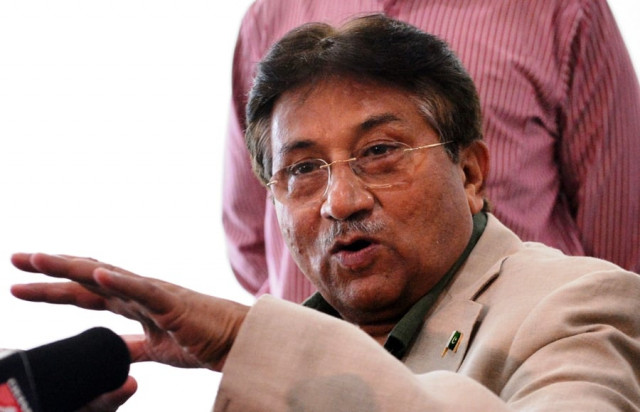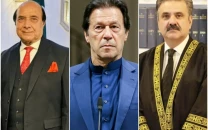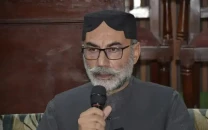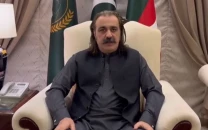Treason trial bench: Defence, prosecution spar over consultation
Musharraf’s lawyers say Nawaz did not take on board the federal cabinet.

Former military ruler Pervez Musharraf speaks during news conference in the Gulf emirate of Dubai on March 23, 2013. PHOTO: AFP
With the absence of General (retd) Pervez Musharraf, the special court constituted to try the former military ruler for high treason witnessed his defence team raising various objections on Monday.
The arguments ranged from challenging the jurisdiction of the special court; the alleged bias of the prime minister and former chief justice against Musharraf, and the constitution of the current three-member bench.
Anwar Mansoor, one of Musharraf’s leading attorneys, advanced his arguments with much repetition. During the proceedings, Justice Faisal Arab, the leading judge of the bench, asked Mansoor to refrain from relying too much on what he said were “irrelevant arguments”.
Musharraf’s legal team also maintained that Prime Minister Nawaz Sharif did not take on board the federal cabinet before issuing a notification regarding the constitution of the three-judge special court to initiate the high treason trial. “The notification was issued in a clerical manner, as the prime minister did not apply his mind,” argued Mansoor.
The public prosecutor, Akram Sheikh, was asked to address the court on this objection, to which he cited certain constitutional provisions and relevant rules and held that it was not mandatory for the prime minister to consult the cabinet before issuing a notification.

“So far, one thing is final: the cabinet was not consulted before issuing of the notification,” Justice Faisal Arab asked.
Sheikh avoided a direct reply to this observation and said that consultation was not required either by the constitution or rules of business, adding that it is not required to be discussed, voted upon or resolved by the cabinet.
Sheikh informed the bench that after the promulgation of the 18th constitutional amendment on October 27, 2011, amendments have been made in the relevant rules of business. Citing the schedule of the Federal Investigation Agency (FIA) Act 1974, Sheikh held that it is specifically entry 14 that deals with this matter.
Under rule 18 of the schedule, the interior ministry is responsible to file a complaint. He further said that under the 32nd entry, investigation and prosecution of the cases is the task of the FIA, including the high treason case.
“The law is the same for all. There is no discrimination in the law; it is for the weakest and the strongest,” the prosecutor said.
Sheikh questioned why the prime minister and federal cabinet should be involved in an investigation and prosecution in violation of the law even if it is a case of high treason.
Today (Tuesday), Musharraf’s legal team will raise objections over the alleged bias of judges of the special court and the jurisdiction of the court itself. In a separate application, the defence team requested the court to shift this high treason case to military court.
Published in The Express Tribune, January 21st, 2014.



















COMMENTS
Comments are moderated and generally will be posted if they are on-topic and not abusive.
For more information, please see our Comments FAQ